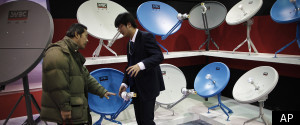
I have lived in Asia -- China and Singapore both -- for approaching eight years now. While I could wax lyrical about the exotic cuisine, culture and peoples, one of the things I truly miss about home, aside from friends, family and proper British food, is quality television.
To be sure, when I first arrived in China as a wastrel young English teacher, the sheer oddness of Chinese television held me fascinated in front of the box. A particular favorite of mine in those early months was the "military channel." I wasn't sure of the channel's actual name, but programming generally consisted of various regiments of the gargantuan People's Liberation Army goose-stepping their way down broad concrete avenues to stirringly brassy patriotic music. George Orwell once wrote that the goose step was used only in countries where people are too scared to laugh at their military: The whole thing was a glossy throwback to footage of Soviet parades you can occasionally catch on documentaries on the History channel.

This was especially true on notable anniversaries, such as the founding of the People's Republic of China or the "Victory in the war against Japanese Aggression." The Byzantium and myriad legions of the world's largest army would be wheeled out to take part in choreographed song and dance routines. Like enormous militaristic glee clubs, each regiment -- all color coordinated and representing a different branch of the PLA -- would harmonize patriotically about the glories of the motherland and what exactly they had done to the Japanese invaders. China must be one of the few countries in the world to maintain battalions of soldiers prized more for their a cappellas than their soldiering.
I made a point of tuning into these martial musicals, but the rest of Chinese television offered limited fare. Kung fu soap operas set in romanticized versions of Imperial China and sporting events featuring Chinese nationals were the norm. Lovers of table tennis, pool and any basketball game that involved Yao Ming were well catered for, but I had cravings for more international offerings.

Satellite TV and its accompanying international channels exist in China, but it is heavily censored. Singapore is almost as censorious, removing or obscuring swear words, nudity and homosexuality -- being gay is still illegal in the city-state. As repellent as this is, there are still occasions of levity. For one thing, British swears seem to fly below the Singapore censor's curse-radar: Guy Ritchie's gangster flick Snatch was shown recently with the f-word predictably bleeped out, but there were a plethora of c-bombs, twats, knobs and other wonders of the English lexicon that the censors presumably thought were quaint local terms of endearment.
While getting satellite TV is a very orderly process in Singapore, in China it's a rather different process. It consisted of four guys turning up at your doorstep with a car boot full of dishes. At my old apartment the security guard ranted a bit when they tried to put the dish. Apparently the proximity of the nearby PLA barracks meant that there was a danger military frequencies could be picked up. Luckily the PRC's plans for Taiwan never did flash up onscreen and interrupt Jamie Oliver.

The TV package was an illegal Philippine feed. Along with the usual offerings, there were a number of peculiarly Pilipino television channels: the Christian ones. At least half a dozen of the 50-odd channels were completely dedicated to a strange kind of evangelical Christianity. Even when the Chinese government periodically scrambled every other channel, JCTV (yes, that's right, JCTV) would come beaming through. Amongst its programming delights were 'show and tell' shows on how man had coexisted with dinosaurs and "evidence" of Noah's Ark, complete with khaki-clad experts and an array of dubious-looking fossils and relics. To be fair, JCTV also did a fine line in a sort of Christian MTV, where righteous rappers and rockers entertained with their tales of sinful debauchery before finding, in their words, "Big JC."
Other evangelical channels were even odder. Surfing through I came across "Sunday Night Prime with Friar Benedict." Imagine a hard-hitting talk show in the style of Parkinson; if Parkinson was a religious extremist with some pretty extreme views on the whole morality and sin thing. Hosted by the eponymous Friar Benedict, a silvery-haired old monk in a medieval brown cassock, the entirety of its small studio audience were similarly attired priests, and nuns in habits. Friar Benedict had turned his attention to the Berlin Love Parade and was imploring his viewers to pray for the homosexual sinners to turn them back to god. It made for some surreal TV as Friar Benedict urged the sinners to cast their evil out and the nuns in the audience quivered and quavered their agreement.
On the plus side, football-mad Asia means I can watch the beautiful game for seven hours straight on a Saturday night. All I'm waiting for now is to find a half-decent British pub serving a ploughman's lunch, and my reasons for moving back to the UK go down by one.